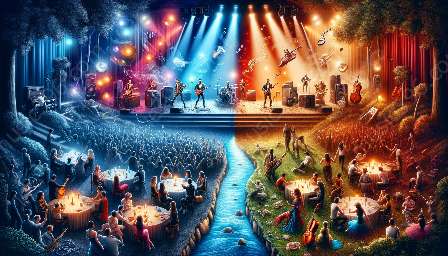In today's digital age, the landscape of marketing and promotion in the pop music industry has undergone a significant transformation. The emergence of digital technology has revolutionized the way pop music is marketed and promoted, enabling artists and record labels to reach a global audience in unprecedented ways. This shift has brought about both challenges and opportunities, shaping the strategies employed by industry professionals and redefining the relationship between artists and their fans.
Influence of Social Media
One of the most profound impacts of the digital age on pop music marketing is the rise of social media platforms. Artists now have direct access to their fans, allowing them to cultivate their brand, engage with their audience, and promote their music on a personal level. Platforms such as Instagram, Twitter, and TikTok have become indispensable tools for building and maintaining a loyal fan base, as artists can share behind-the-scenes content, upcoming releases, and interact with fans in real time.
Moreover, social media has redefined the concept of celebrity, blurring the lines between artists and their audience. Fans feel closer to their favorite pop stars, as social media provides an intimate glimpse into their personal lives and creative process. This level of accessibility has transformed the way artists are marketed, creating a more relatable and authentic image that resonates with fans.
Streaming Platforms and Digital Distribution
The advent of streaming platforms such as Spotify, Apple Music, and YouTube has revolutionized the distribution and consumption of pop music. Gone are the days of physical CD sales dominating the market, as streaming has become the primary mode of music consumption for the digital generation. This shift has prompted a reevaluation of how music is promoted, as success on streaming platforms now heavily influences an artist's visibility and revenue.
Marketing strategies in the digital age often center around securing prominent placement on popular playlists and leveraging algorithmic recommendations to reach new listeners. Furthermore, the accessibility of digital distribution has democratized the industry, allowing independent artists to promote their music on a global scale without the need for major label support. This has led to a diversification of musical styles and greater inclusivity within the pop music landscape.
Data-Driven Marketing
Digital technology has also ushered in an era of data-driven marketing and audience analytics. With the wealth of data available through streaming platforms and social media, marketers can gain insights into listener preferences, geographic trends, and demographic information. This data empowers marketing teams to tailor promotional campaigns with precision, targeting specific audience segments and maximizing the impact of their efforts.
Furthermore, digital marketing allows for real-time measurement of campaign performance, enabling rapid adjustments based on audience engagement and feedback. This iterative approach to promotion ensures that marketing strategies remain agile and responsive to evolving trends, ultimately enhancing the effectiveness of promotional efforts in the pop music industry.
Virtual Performances and Experiential Marketing
In light of the digital age, the concept of live performances has expanded to include virtual experiences and interactive marketing initiatives. With advancements in virtual reality (VR) and augmented reality (AR) technology, artists can engage fans through immersive digital concerts, interactive apps, and virtual meet-and-greets. These innovative experiences not only serve as promotional tools but also generate new revenue streams while offering fans unique and memorable interactions with their favorite artists.
Furthermore, brands and sponsors have increasingly aligned themselves with pop music through immersive experiential marketing activations. From pop-up events to interactive installations, these initiatives leverage digital technology to create memorable brand experiences that resonate with fans and enhance the visibility of artists and their music.
Challenges and Opportunities
While the digital age has undoubtedly revolutionized pop music marketing and promotion, it has also presented unique challenges for artists and industry professionals. The democratization of music distribution has resulted in an oversaturated market, making it increasingly difficult for emerging artists to stand out amidst the abundance of content. This has intensified the competition for visibility and necessitated innovative strategies to capture the attention of audiences.
Additionally, the rapid evolution of digital platforms and algorithms requires marketers to continuously adapt their approaches to remain effective. As trends and consumer behaviors shift, marketing strategies must evolve to keep pace with the dynamic digital landscape, presenting ongoing challenges for industry professionals.
However, the digital age has also brought about unparalleled opportunities for artists to connect with global audiences, harness data-driven insights, and create immersive experiences that transcend traditional boundaries. By embracing the digital revolution and leveraging its potential, pop music marketing and promotion can continue to evolve, offering new avenues for artists to thrive in a rapidly changing industry.
Conclusion
The impact of the digital age on marketing and promotion in pop music has been profound, reshaping the industry and redefining the strategies employed by artists and marketing professionals. From the transformative influence of social media to the democratization of digital distribution, the digital age has brought about unprecedented changes and opportunities. By embracing data-driven insights, immersive experiences, and evolving digital platforms, the pop music industry can navigate the challenges posed by the digital revolution and continue to captivate global audiences in innovative ways.























